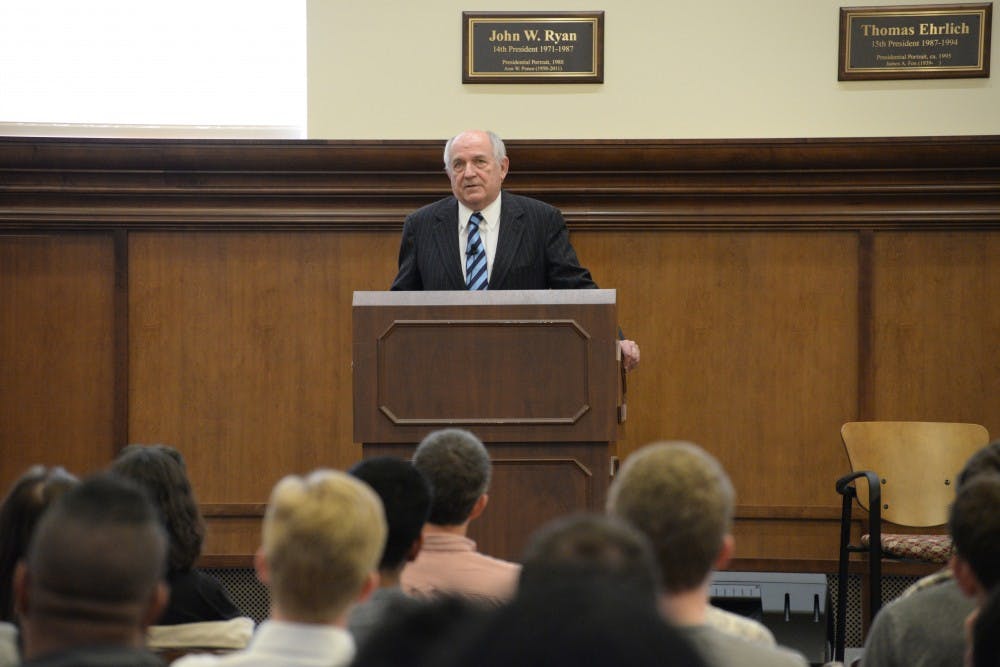Robert and Judy Woodley were the first people lined up at the ticket entry Tuesday night by Franklin Hall to see controversial social scientist and author Charles Murray speak.
“I think Charles Murray is an important voice,” Robert said. “Whether you agree or not.”
Robert said he had read Murray’s book “Coming Apart” and agreed with what Murray said about society dividing into two parts. However, Robert said he did not agree with Murray’s conclusions in his book “The Bell Curve.”
In the book, there was a section that featured a discussion on racial differences affecting intelligence that caused controversy.
Murray talked about the way the new upper class, as described in one of his books, led to the election of President Trump. He spoke for about 30 minutes and devoted another 30 to questions. These questions were written on paper by speech attendees as they entered the room. The moderator then picked the questions to ask Murray.
He spent the first part of his speech introducing the development of the new upper class and said higher education began to develop an eye for academic talent. He cited the SAT scores of incoming Harvard freshmen from 1952 to 1960 as evidence of this. He then discussed the bubble quiz he helped create.
The test informs people how much of a bubble they live in. The lower the score, the thicker the bubble and the less capable one is able to connect with the working class. The scores range from 0-100.
He said questions on the test included whether or not the participant had ever been in a job that caused them pain by the end of the day and if they had ever purchased a pick-up truck.
Typically, those with higher socioeconomic statuses will have a lower score indicating how the upper classes are becoming disassociated with the working class families in America, and this divide helped lead to the election of Trump. Murray said his score was a 57.
From inside Presidents Hall, Robert said he believed that the security outside the building seemed like overkill. While he said he believes protesting is a right to exercise, preventing someone from speaking was inexcusable.
While the protests outside did not prohibit Murray from speaking, he did have to fight to ignore the commotion from outside the windows.
The last question of the night asked Murray how he wanted to respond to the protesters.
“I really wish you kept quiet while I was speaking,” he said.
Bill Walker, a sophomore history major, attended the speech because he believed it was important to listen to different view points while at college. He considers himself a libertarian but said he had not read Murray’s books, though he had watched interviews with him.
He said he would not comment about whether he agreed or disagreed with Murray’s beliefs because he was in no position academically to do so because he had never taken a sociology class.
He did say that he believed the protesters would have benefited more from listening to what Murray was saying instead of protesting outside.
“If there’s a liberal protesting, it’s not in their best interest to protest,” Walker said. “They could come in here and listen to what he has to say and maybe rebut it.”
Hunt Harvey, a senior studying political science, attended Murray’s speech as well. He said he believed that Murray gave a good speech and agreed with the majority of the points that Murray made. The only exception was one Murray made during his speech about the law not doing anything to help civil rights movements.
Harvey said he had expected the protest and believed IU did a good job with the event security.
After the event, Robert said he expected the room to be jam-packed with students and was surprised that more were protesting instead of listening to Murray’s talk. His wife agreed.
“I think they would have learned something if they had had an open mind and listened,” Judy said. “They don’t have to agree. That goes for me, too.”






